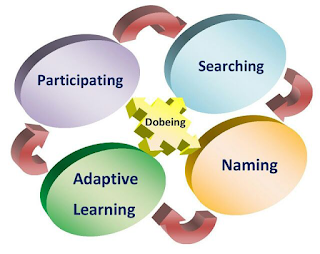Soulagogy a new learning approach
Learning approaches are usually based on the distinction between a pedagogical and androgogical form of teaching. The approaches of teaching can be distinguished by their different perceptions of the relations between subject matter, teacher and student. Soulagogy is based on a total new aspect of education: the process that is happening in the Soul during learning.
The pedagogical approach is based on L. Wittgenstein's idea that the teacher is the expert within a language game and that teaching is to be seen as the teacher's communication of expert knowledge to the student. Learning is the student's acquisition of this knowledge. Prior to the classroom teaching, the teacher defines clear learning objectives and chooses the subject matter that is to be worked with in the classroom. The subject matter is selected so that it distributes the quantity of information that the teacher believes is relevant to the student in relation to the given topic. The teacher and the subject are in the center and not the student.
After teaching, the teacher will be able to compare the student's learning outcomes with the learning objectives that the teacher defined before the teaching begun. The student's learning outcome can be tested through closed tasks and tests.
The androgogical approach of teaching is based on J. Dewey's idea that student has an inherent basis of knowledge that can be developed through interaction with the outside world and solving problems. Learning is seen as the student's development of this inherent basis of knowledge. The teacher chooses a subject matter, which could make it possible for the student to experience what is relevant and to define and solve authentic problems. In the learning situation, the student chooses to work with the parts of the subject matter that he or she finds relevant and then uses this part of the subject matter as a basis for solving problem. The student's learning outcome can be tested through case assignments and simulations, where the student can show that he or she can use gained experience within different context.
Soulagogy: to lead the soul, is a new term by Nir Golan. Soul or psyche (Greek: "psyühē", of "psychein", "to breathe") are the mental abilities of a living being: reason, character, feeling, consciousness, memory, perception, thinking, etc. Agogy (Greek: ἄγω ágō), "I lead", to lead. Soulagogy: to lead the soul, means: Educating the soul. While the Searching phase in Soulagogy model, the dim glass is reviled in which the senses are first called to display the soul-Dobeing, until, aided by the keener state of imagination. It separates those outward types of itself from their sensual connection, in its own bright mirror recognizes again itself, as a distinctive Dobeing in space and time, but out of it in existence, and painting itself upon these, as emblems of its inner and super-sensual life which no outward thing can fully portray. In the Naming phase a language is to be instituted between [the child’s] spirit and the surrounding scene of things in which he dwells. He, who is seeking to know his Dobeing in the Searching phase, should be ever seeking himself in external things in the Naming phase, and by so doing will he be best able to find, and explore his inmost light in the Adaptive Learning phase.
Society has created these Soulagogical learners. When they discover something they like, they are excited to share it with their friends using digital devices and social media tools. This is how they want their educational experience to be. Soulagogical learners want to learn collaboratively and to apply what they have learned through creative path-way. They prefer learning on their own time and on their own terms and want to be involved in real-life issues that matter to them. Educators need to think about their own behaviors according to the Soulagogy approach and work to apply its principles for the betterment of learners of all ages.
Based on Amos Bronson Alcott's quotation




תגובות
הוסף רשומת תגובה